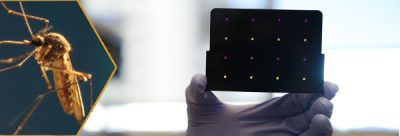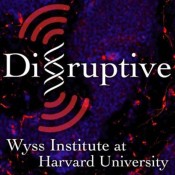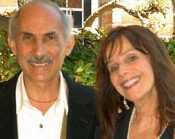Disruptive #7: FISSEQ – Fluorescent In Situ Sequencing
Written on October 7th, 2016Until recently, to analyze many mRNAs simultaneously, scientists had to grind cells to a pulp, which left them unable to pinpoint those mRNAs within the cell. Developed by a team at the Wyss and Harvard Medical School, FISSEQ allows scientists to pinpoint thousands of mRNAs and other types of RNAs at once in intact cells, and stands to revolutionize clinical diagnostics and drug discovery.
Listen and subscribe to Disruptive on Soundcloud, iTunes, or Google Play.
Disruptive#6: Rapid, Low-cost, Paper-based Test for Zika
Written on June 24th, 2016
Disruptive: Synthetic Biology Pamela Silver & George Church
Written on February 21st, 2016
I’m excited to offer the first episode of DISRUPTIVE, my new monthly podcast series produced with Harvard’s Wyss Institute for Biologically Inspired Engineering. The mission of the Wyss Institute is to: Transform healthcare, industry, and the environment by emulating the way nature builds, with a focus on technology development and its translation into products and therapies that will have an impact on the world in which we live. Their work is disruptive not only in terms of science but also in how they stretch the usual boundaries of academia.
In this inaugural episode, Wyss core faculty members Pamela Silver and George Church explain how, with today’s technology breakthroughs, modifications to an organism’s genome can be conducted more cheaply, efficiently, and effectively than ever before. Researchers are programming microbes to treat wastewater, generate electricity, manufacture jet fuel, create hemoglobin, and fabricate new drugs. What sounds like science fiction to most of us might be a reality in our lifetimes: the ability to build diagnostic tools that live within our bodies, find ways to eradicate malaria from mosquito lines, or possibly even make genetic improvements in humans that are passed down to future generations. Silver and Church discuss both the high-impact benefits of their work as well as their commitment to the prevention of unintended consequences in this new age of genetic engineering.
Free Forum Q&A – JACK KORNFIELD & TRUDY GOODMAN A CELEBRATION of MINDFULNESS
Written on October 31st, 2015
On November 15, InsightLA, the leading Los Angeles-based Mindfulness Meditation organization, will host LIVING WITH A JOYFUL SPIRIT AND A WISE HEART, a day of deep teachings and timeless wisdom that will feature Trudy Goodman and Jack Cornfield in dialogue via video with a “who’s who” of the pioneers of mindfulness meditation in the West – Jon Kabat-Zinn (Wherever You Go, There You Are), Ram Dass (Be Here Now), Tara Brach (Radical Acceptance), Joseph Goldstein (Insight Meditatino), and Congressman Tim Ryan (A Mindful Nation). Both Trudy and Jack turn 70 this year. In the course of the conversation, we talk about their personal paths, what each of their guests means to them, and we tell the story of mindfulness in America over the last forty-five years.
Trudy Goodman has trained and practiced in two fields for over 25 years: meditation and psychotherapy. She studied developmental psychology with Jean Piaget, Lawrence Kohlberg, and Carol Gilligan, and for 20 years worked in a full psychotherapy practice. Since 1974, Trudy has devoted much of her life to practicing Buddhist meditation and teaching mindfulness. In 2002, Trudy founded InsightLA.
Jack Kornfield is a co-founder of the Insight Meditation Society in Barre, Massachusetts, and founding teacher of the Spirit Rock Center in Woodacre, California. His books have been translated into 20 languages and sold more than a million copies. They include, A Path with Heart; After the Ecstasy, the Laundry; Buddha’s Little Instruction Book; and A Wise Heart: A Guide to the Universal Teachings of Buddhist Psychology.
DISRUPTIVE: BIO-INSPIRED ROBOTICS features three separate interviews with (1) RADHIKA NAGPAL, (2) ROBERT WOOD, and (3) CONOR WALSH
Written on October 15th, 2015Welcome to the second episode of my new monthly podcast series produced with Harvard’s Wyss Institute for Biologically Inspired Engineering.
DISRUPTIVE: BIO-INSPIRED ROBOTICS features three separate interviews with (1) RADHIKA NAGPAL, (2) ROBERT WOOD, and (3) CONOR WALSH. From insects in your backyard, to creatures in the sea, to what you see in the mirror, engineers and scientists at Wyss are drawing inspiration to design a whole new class of smart robotic devices
In this one, CONOR WALSH discusses how a wearable robotic exosuit or soft robotic glove can assist people with mobility impairments, as well as how the goal to create real-world applications drives his research approach.
In part one, RADHIKA NAGPAL talks about her work Inspired by social insects and multicellular systems, including the TERMES robots for collective construction of 3D structures, and the KILOBOT thousand-robot swarm. She also speaks candidly about the challenges faced by women in the engineering and computer science fields.
In part two, ROBERT WOOD discusses new manufacturing techniques that are enabling popup and soft robots. His team’s ROBO-BEE is the first insect-sized winged robot to demonstrate controlled flight.
The mission of the Wyss Institute is to: Transform healthcare, industry, and the environment by emulating the way nature builds, with a focus on technology development and its translation into products and therapies that will have an impact on the world in which we live. Their work is disruptive not only in terms of science but also in how they stretch the usual boundaries of academia.
http://wyss.harvard.edu/
– See more at:
DISRUPTIVE: BIO-INSPIRED ROBOTICS Radhika Nagpal Interview
DISRUPTIVE: BIO-INSPIRED ROBOTICS Robert Wood Interview
Conor Walsh’s interview transcript
http://aworldthatjustmightwork.com/2015/07/auto-draft-18/





